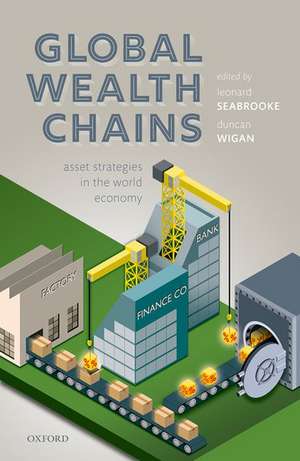Global Wealth Chains: Asset Strategies in the World Economy
Editat de Leonard Seabrooke, Duncan Wiganen Limba Engleză Hardback – 26 mai 2022
Preț: 536.92 lei
Preț vechi: 766.94 lei
-30% Nou
Puncte Express: 805
Preț estimativ în valută:
102.74€ • 107.56$ • 85.01£
102.74€ • 107.56$ • 85.01£
Carte disponibilă
Livrare economică 05-11 martie
Preluare comenzi: 021 569.72.76
Specificații
ISBN-13: 9780198832379
ISBN-10: 0198832370
Pagini: 316
Dimensiuni: 160 x 240 x 22 mm
Greutate: 0.68 kg
Editura: OUP OXFORD
Colecția OUP Oxford
Locul publicării:Oxford, United Kingdom
ISBN-10: 0198832370
Pagini: 316
Dimensiuni: 160 x 240 x 22 mm
Greutate: 0.68 kg
Editura: OUP OXFORD
Colecția OUP Oxford
Locul publicării:Oxford, United Kingdom
Recenzii
This volume is a vital complement to the well-established literature on global value chains. In an ambitious introduction, Seabrooke and Wigan lay the groundwork for this analytical project by developing a typology of global wealth chains. Contributors bring these ideal types to life through theoretically and empirically rich explorations of fields as diverse as art, mining, and public utilities. By focusing on asset strategies and the interpretive communities that devise and defend them, this volume pioneers a method for unraveling the intentionally complex and opaque machinations by which wealth is accumulated and maintained. It is essential reading for anyone seeking to understand the nature of power, privilege, and inequality in the global political economy.
Global Value Chains (GVCs) enable firms to make things cheaply and maximize profits. But what happens to those profits? If production is about value, then profits are about wealth. And just as GVCs create those profits, so Global Wealth Chains -- profit defending asset strategies -- keep those profits out of the hands of those outside the firm (workers, regulators, governments) that would like to get their hands on them. Seabrooke and Wigan and their collaborators show us through detailed case studies how wealth is defended, augmented and extended through a variety of corporate and other legal forms.
With their concept of global wealth chains, Seabrooke and Wigan have opened up a powerful new stream of research that addresses a central issue in modern societies -- how wealth is maintained and reproduced in a world characterised by economic uncertainties, financial market instabilities, state revenue and tax authorities, and egalitarian social movements. This is essential reading for anybody interested in how wealth is sustained and protected in the contemporary period. It is a truly inter-disciplinary project that reflects the best of contemporary social science and its ability to reveal to society and policy makers the opaque structures and processes that underpin current conditions of inequality of wealth and power.
Global Value Chains (GVCs) enable firms to make things cheaply and maximize profits. But what happens to those profits? If production is about value, then profits are about wealth. And just as GVCs create those profits, so Global Wealth Chains -- profit defending asset strategies -- keep those profits out of the hands of those outside the firm (workers, regulators, governments) that would like to get their hands on them. Seabrooke and Wigan and their collaborators show us through detailed case studies how wealth is defended, augmented and extended through a variety of corporate and other legal forms.
With their concept of global wealth chains, Seabrooke and Wigan have opened up a powerful new stream of research that addresses a central issue in modern societies -- how wealth is maintained and reproduced in a world characterised by economic uncertainties, financial market instabilities, state revenue and tax authorities, and egalitarian social movements. This is essential reading for anybody interested in how wealth is sustained and protected in the contemporary period. It is a truly inter-disciplinary project that reflects the best of contemporary social science and its ability to reveal to society and policy makers the opaque structures and processes that underpin current conditions of inequality of wealth and power.
Notă biografică
Leonard Seabrooke is Professor of International Political Economy and Economic Sociology in the Department of Organization at Copenhagen Business School, and Research Professor at the Norwegian Institute of International Affairs. His work is known for its interdisciplinarity, drawing on political economy, economic sociology, international relations, and organization studies. His current research concentrates on transnational professionals across a range of cases, from finance and tax experts, to consultants, sustainability experts, and others. Seabrooke's work has appeared in leading journals, including American Sociological Review, Annual Review of Sociology, Governance, Public Administration, Review of International Political Economy, and many others.Duncan Wigan is Professor MSO of International Political Economy in the Department of Organization at Copenhagen Business School. His work has focused on innovation and governance in financial markets, corporate organization, and activism for economic justice. His current research concentrates on issues of international taxation, intangible capital, and expert-activism. His work has appeared in leading journals, including Economy & Society, New Political Economy, Regulation & Governance, Review of International Political Economy, and many others.
